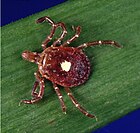Smarididae
Appearance
| Smarididae Temporal range:
| |
|---|---|
| Scientific classification | |
| Kingdom: | |
| Phylum: | |
| Class: | |
| Superorder: | |
| Order: | |
| Superfamily: | |
| Family: | Smarididae Kramer, 1878
|
| Genera include | |

Burmite
) from Hkamti, Myanmar.Smarididae is a family of
predatory
mites have long oval bodies, distinctively pointed in front. They are usually red and densely hairy with slender legs, sometimes very long. They have either one or two pairs of eyes.
Fossil record
The Cretaceous smaridid Immensmaris chewbaccei had idiosoma of more than 8 mm (0.31 in) in length and was the largest fossil acariform mite and also the largest erythraeoid mite ever recorded.[1]
References
- ^ J. A. Dunlop, K. Frahnert, and J. Makol. 2018. A giant mite in Cretaceous Burmese amber. Fossil Record 21:285-290
Further reading
- Nine new species of the superfamily Erythraeoidea (Acarina: Trombidiformes) associated with plants in South Africa, Magdalena K.P. Meyer & P.A.J. Ryke, Acarologia I

